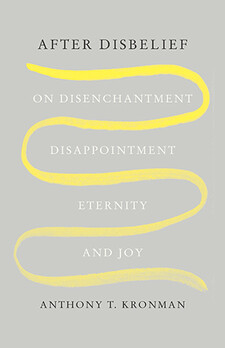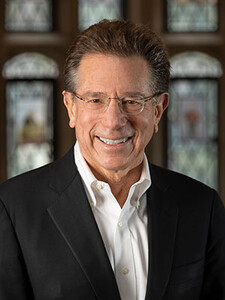Professor Kronman Seeks Eternity in an Age of Disenchantment

The latest book by Anthony T. Kronman ’75 is evidence that his parents’ plan to shield him from God did not entirely succeed.
“Children are attracted to dangerous things,” the Sterling Professor of Law and former Dean writes in the opening of After Disbelief: On Disenchantment, Disappointment, Eternity, and Joy (Yale University Press). “The more they are warned about them, the more curious they become. That is what happened with me and religion.”

And so the son of two nonbelievers begins his inquiry with human experience — his own — and works his way up to larger themes. Kronman describes his upbringing by parents who “had an allergy to God.” Despite a nagging curiosity about religion, Kronman eventually adopted his mother’s existentialism. He studied philosophy, earning a B.A. from Williams College and a Ph.D. from Yale before starting his J.D. at Yale Law School. But he later became disenchanted with Camus and Sartre. In middle age, Kronman writes, he came to believe that God has a central, indeed necessary, place in human life — though not God in the traditional sense of the word.
Kronman finds his God by means of reason alone. It is not the God of Abraham. Nor is it incompatible with science. “But it is a God nonetheless,” he writes. “It serves as the explanatory ground of everything that happens in time only because it is itself unconditioned by time.”

Kronman acknowledges that his “positive” if somewhat “eccentric” idea of God puts him at odds with most followers of conventional religions. His views are also likely to confound most of his academic peers for whom, Kronman writes, “the only respectable view of God is that he doesn’t exist.”
The Abrahamic religions, like the pagan philosophical traditions that came before them, promise to fulfill their followers’ spiritual longings — to close the gap between human beings and what Kronman calls the eternal and divine. Atheists, on the other hand, find poignancy and meaning in the fleeting experiences of life; they have no interest in a connection to the eternal and divine. Both worldviews have their limitations, according to Kronman. Atheism’s dismissal of the longing for eternity denies an essential part of the human condition. At the same time, this longing is one that can never be fulfilled so long as we continue to be human at all.
Kronman does not claim to prove the existence of his God. He says, though, that we need the idea of such a God to make sense of our own humanity. He concludes that his idea is “more humane” than the alternatives. Its elaboration, he says, is an ongoing project.
“There is always more work to be done,” Kronman writes. “I find the prospect joyful.”


